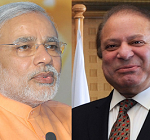Watching Pakistan’s media, it seems no one is impressed with or concerned about Narendra Modi’s impending rise to power in India. Journalist Amir Mateen wrote a series of columns recently, after his visit to India for a Track-II dialogue, discussing Modi and the Indian elections. Social activist Nilofer Afridi Qazi had tweeted about the lack of discussion in the media, and among bloggers and Twitterati, on the Indian elections in general and Modi in particular.
So is it that no one is concerned about Narendra Modi, despite his links with the BJP, and by extension the RSS? This seems peculiar, since Pakistan’s primary source of security concern remains India. Perhaps, the lack of opinion is in itself an opinion; people are aware of where Modi is coming from, but hope realpolitik would play a dominant role in influencing his policy on Pakistan.
However, a primary reason for the lack of articulated positions on Modi pertains to the structure of opinion-making in Pakistan. Unlike India, which has at least two correspondents in Islamabad, Pakistan has none in New Delhi. Keeping at least two journalists on either side is part of the bilateral arrangement, but neither the PPP nor the PML-N governments have despatched any journalists to Delhi.
This is less about inefficiency and more about the friction between political players and the military. The latter would like to take the call on which journalist to despatch across the border.
Under the last PPP government, the Radio Pakistan head recalled his man in Delhi because he was allegedly working more for the agencies than his organisation.
The other problem is that given Pakistan’s internal conditions, especially the threat from terrorism and the war on terror, the entire media remains focused more on internal politics. Despite the gravity of India-Pakistan relations, there are hardly any India experts in Pakistan. Nor is there any interest in developing expertise on the larger neighbour, or on the south Asian region in general.
It would be unfair to argue though that there is no position on Modi. On the extreme right are the militants who have expressed their concern about Modi’s election. In fact, the Jaish-e-Mohammad has threatened to kill Modi if he becomes prime minister. Though not many support such an extreme stance, Modi is generally viewed with suspicion due to his alleged involvement with the Gujarat massacre. He is considered hostile towards the Muslim minority in India.
The Pakistani establishment itself seems less concerned about Modi’s ascendency. This is because it remains doubtful if he will become the prime minister in 2014. Moreover, in Islamabad’s imagination the BJP offers a better option as far as bilateral relations are concerned. The memory of BJP’s peace overtures under Atal Bihari Vajpayee are ingrained in the establishment’s imagination, giving hope to both the political government and the military, that things would not go drastically wrong even if Narendra Modi rose to power.
Thus, during a Track-II organised by the Jinnah Institute in Islamabad last year, when Nawaz Sharif’s advisor on foreign relations, Sartaj Aziz, was asked whether he was concerned about Modi coming to power, he replied, “Modi is India’s problem, not Pakistan’s”. The answer shows that Islamabad is not overly concerned, and feels that Modi will tone down his hardline view on Pakistan due to imperatives such as economic relations. The only problem is that the economic relations are not taking off according to Delhi’s expectations. Islamabad continues to dither on granting MFN status to India.
However, the relations between Indian Muslims and the government, and the BJP – both led by Narendra Modi – does concern Pakistan.
Worsening of relations between the government and the Muslim minority is bound to increase pressure on the Pakistan government, especially from the militant groups, that are there to fulfill larger policy objectives of the state. In case the rhetoric turns aggressive in response to some unpleasantness inside India, the military might not be able to fully control its proxies. Any terrorist activity in India is likely to increase tensions between the two neighbours, with a possibility of violence.
In a recent Track-II in Delhi, journalist Vinod Sharma warned the Pakistani participants of the likelihood of a BJP under Modi responding to an act of terror. He was of the opinion that an attack like the one in Mumbai would beget six such responses.
Nevertheless, it is also believed that such things are easier said than done. The Indian security establishment is not yet clear how far to push the envelope. This also means that once Modi is in power, the various stakeholders in Pakistan will re-assess the limits of India’s reaction.
Ayesha Siddiqa is an independent Islamabad-based social scientist. She is the author of two books: ‘Pakistan’s Arms Procurement and Military Build-up, 1979-99: In Search of a Policy’ and ‘Military Inc, Inside Pakistan’s Military Economy’.
This blog was exclusively written for Gateway House: Indian Council on Global Relations. You can read more exclusive content here.
For interview requests with the author, or for permission to republish, please contact outreach@gatewayhouse.in.
© Copyright 2014 Gateway House: Indian Council on Global Relations. All rights reserved. Any unauthorized copying or reproduction is strictly prohibited


